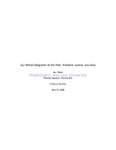Our Moral Obligation to the Poor: Freedom, Justice, and Duty

View/
Author
Fisher, Lawrence J.
Subject
Washington and Lee University, Shepherd Poverty Program
Capabilities approach (Social sciences)
Poverty
Philosophy
Political science
Social justice
Ethics
Sen, Amartya, 1933-
Pogge, Thomas, 1953-
Beauvoir, Simone de, 1908-1986
Metadata
Show full item recordDescription
Lawrence J. Fisher is a member of the Class of 2009 of Washington and Lee University. Capstone; [FULL-TEXT FREELY AVAILABLE ONLINE] My research draws upon varying philosophies and moral systems that have significant implications for our duties to both the domestic and the global poor. This methodology resembles that of Thomas Pogge in World Poverty and Human Rights in that the basis for these duties will be a dominant moral system, or an aggregate of several prominent moral systems. Essentially, I seek to evaluate fairly disparate philosophies in order to suggest that their understandings of freedom and justice are highly compatible. Furthermore, I will suggest that there are strong ethical implications for politics to be drawn from this evaluation, and specifically for the economic and social structure of society and its effect on the poor. Within the philosophical discussion of poverty, there is a dichotomy between moralists who espouse the moral primacy of negative duties, and moralists who, directly or indirectly, express the necessity of positive obligations in human society. I believe that this dichotomy reflects a deficient understanding of human nature, and the interaction between politics and philosophy. By understanding the psychological and philosophical basis of human nature, we can more comprehensively understand the meaning and basis of concepts like freedom, justice, as well as the duties that they entail. [From introductory section] Lawrence J. Fisher